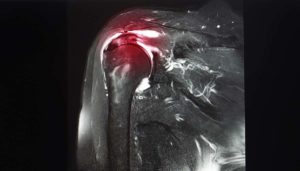
Shoulder Impingement
Typical Symptoms
Impingement typically causes a sharp pain when the shoulder is taken to a certain position or beyond a particular range. Over time, if symptoms are ongoing or progressive, the range of movement of the shoulder can be limited further and there can be chronic pain. Night pain can also affect sleep and in the morning there can be a degree of shoulder sorness/stiffness. Finally, there may also be a radiation of pain along the arm.

What causes it?
Shoulder impingement essentially means “catching”, and can be due to a variety of causes, including degenerative (wear and tear) changes in the bones, thickening or swelling of the tendons or the bursa and also altered movement patterns. It can arise from trauma, altered function or even neurological conditions.
How can I help myself?
It is important to reflect on when the symptoms arose and how it is impacting you. By trying to keep the shoulder mobile, if possible, it should hopefully limit stiffness developing in the joint.
If pain is the overriding factor, taking regular analgesia, such as anti-inflammatories, can help and adding in treatments such as acupuncture or cupping can also reduce pain/stiffness symptoms.
When to seek help?
If your pain is ongoing or if it is progressive, together with a reduction in your range of movement or night time disturbance, it would be good to have your shoulder symptoms assessed.
What are the treatment options?
Your clinician will assess you with a thorough history and clinical examination to identify where the symptoms may be coming from. An X-ray may help identify whether the impingement is due to degenerative changes in the bones, or your doctor may perform an ultrasound scan to look for tendon injuries, bursal thickening or similar changes. If there does not appear to be significant changes, treatment with rehabilitation or acupuncture can be instigated.
If you have muscle tightness, a sports therapist maybe helpful. Some clinicians may be able to offer you an ultrasound-guided high volume injection for the pain to then enable you to move the shoulder more easily.
If your symptoms are persistent, an MRI scan maybe helpful in identifying if there are any subtle tears or changes within the shoulder joint itself. After this, if needed, a surgical opinion may be sought.




